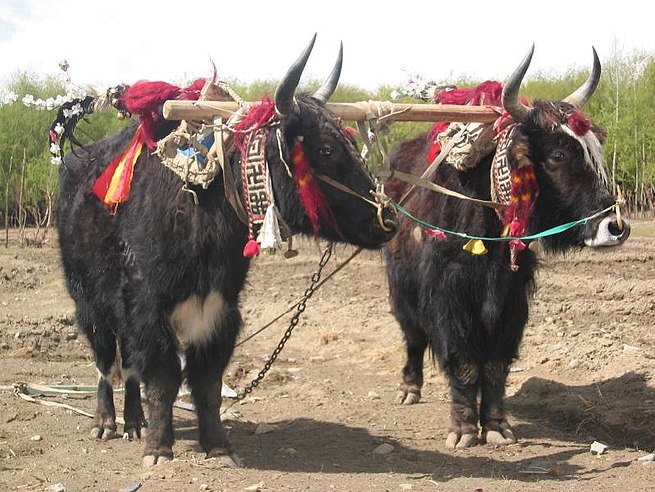Yaknoun
An ox-like mammal native to the Himalayas and Tibet with dark, long, and silky hair, a horse-like tail, and a full, bushy mane.
Yaknoun
(slang) A talk, particular an informal talk; chattering; gossip.
Yaknoun
(slang) A laugh.
Yaknoun
(slang) Vomit.
Yaknoun
(slang) A kayak.
Yakverb
To talk, particularly informally but persistently; to chatter or prattle.
Yakverb
To vomit, usually as a result of excessive alcohol consumption.
Yaknoun
A bovine mammal (Poëphagus grunnies) native of the high plains of Central Asia. Its neck, the outer side of its legs, and its flanks, are covered with long, flowing, fine hair. Its tail is long and bushy, often white, and is valued as an ornament and for other purposes in India and China. There are several domesticated varieties, some of which lack the mane and the long hair on the flanks. Called also chauri gua, grunting cow, grunting ox, sarlac, sarlik, and sarluc.
Yaknoun
noisy talk
Yaknoun
large long-haired wild ox of Tibet often domesticated
Yaknoun
a large domesticated wild ox with shaggy hair, humped shoulders, and large horns, used in Tibet as a pack animal and for its milk, meat, and hide.
Yaknoun
trivial or unduly prolonged conversation.
Yakverb
talk at length about trivial or boring subjects
Yak
The domestic yak (Bos grunniens) is a long-haired domesticated cattle found throughout the Himalayan region of the Indian subcontinent, the Tibetan Plateau, Northern Myanmar, Yunnan, Sichuan and as far north as Mongolia and Siberia. It is descended from the wild yak (Bos mutus).
Muskoxnoun
alternative spelling of musk ox
Muskox
The muskox (Ovibos moschatus, in Latin ), also spelled musk ox and musk-ox (in Inuktitut: ᐅᒥᖕᒪᒃ, umingmak; in Woods Cree: ᒫᖨᒨᐢ, mâthi-môs, ᒫᖨᒧᐢᑐᐢ, mâthi-mostos), is a hoofed mammal of the family Bovidae. Native to the Arctic, it is noted for its thick coat and for the strong odor emitted by males during the seasonal rut, from which its name derives.
























